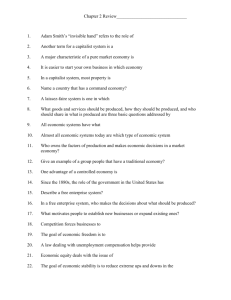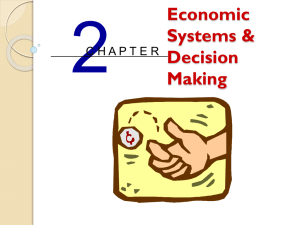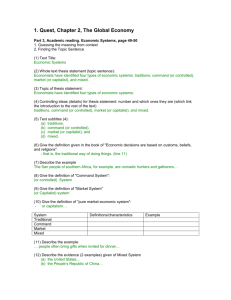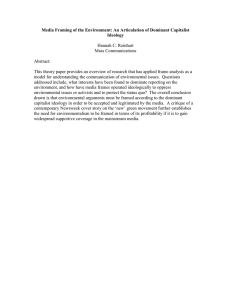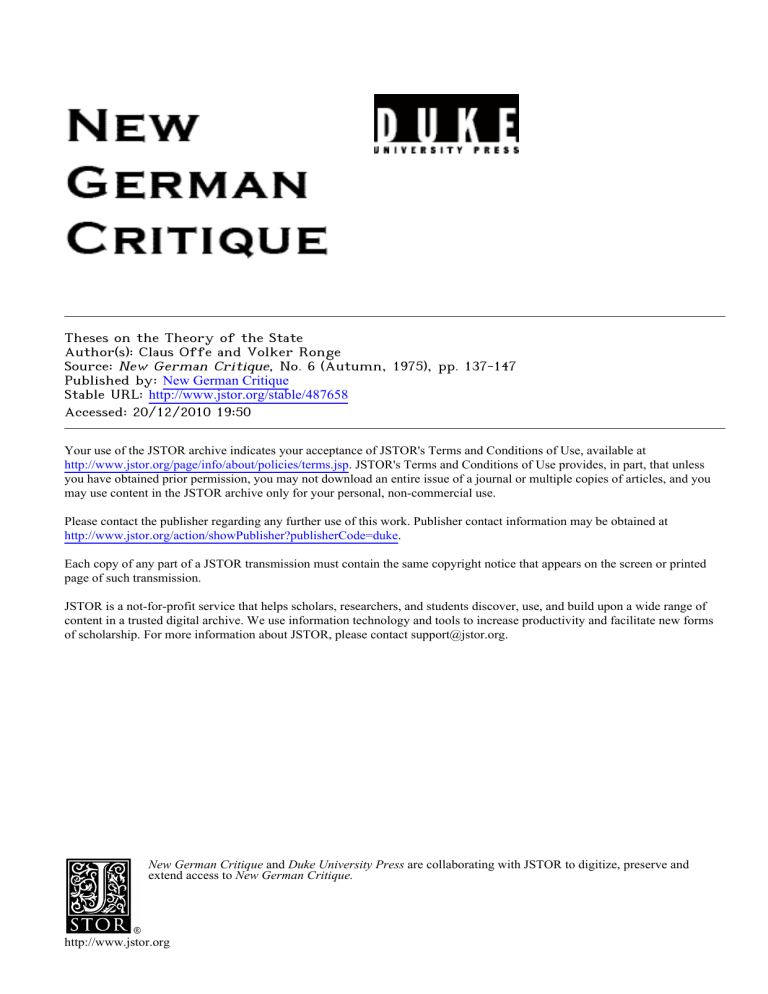
Theses on the Theory of the State Author(s): Claus Offe and Volker Ronge Source: New German Critique, No. 6 (Autumn, 1975), pp. 137-147 Published by: New German Critique Stable URL: http://www.jstor.org/stable/487658 . Accessed: 20/12/2010 19:50 Your use of the JSTOR archive indicates your acceptance of JSTOR's Terms and Conditions of Use, available at . http://www.jstor.org/page/info/about/policies/terms.jsp. JSTOR's Terms and Conditions of Use provides, in part, that unless you have obtained prior permission, you may not download an entire issue of a journal or multiple copies of articles, and you may use content in the JSTOR archive only for your personal, non-commercial use. Please contact the publisher regarding any further use of this work. Publisher contact information may be obtained at . http://www.jstor.org/action/showPublisher?publisherCode=duke. . Each copy of any part of a JSTOR transmission must contain the same copyright notice that appears on the screen or printed page of such transmission. JSTOR is a not-for-profit service that helps scholars, researchers, and students discover, use, and build upon a wide range of content in a trusted digital archive. We use information technology and tools to increase productivity and facilitate new forms of scholarship. For more information about JSTOR, please contact support@jstor.org. New German Critique and Duke University Press are collaborating with JSTOR to digitize, preserve and extend access to New German Critique. http://www.jstor.org Notes: Theses on the Theory of the State* by ClausOffe and VolkerRonge Although important Marxist contributions to the long neglected problem of the state have recently begun to appear, these have often failed to keep pace with the increasing dislocation and crisis of the capitalist state itself. I While Miliband's study has taken into account changes in the nature of the ruling class, the absence of a theoretical approach to the social function and organization of the state limits his work to a redirection of the notion of a 'plurality of elites' into a theory of the influence of the ruling class. At the same time, Nicos Poulantzas' notion of the state as an autonomous structure, paralleling the structure of the dominant class, is impaired by structuralist blinders to the extent that it fails to take into consideration either the historical character of the state as a changing entity, or its concrete empirical character within the social totality. In contrast to these approaches, Claus Offe, whose work has received less attention in the U.S., has consistently attempted to relate analytical categories of the structure and function of the state to historical changes in the nature of advanced capitalist society, while paying close attention to the empirical characteristics of state activity. His essays have therefore exhibited remarkable development as well as sophistication, while maintaining a close relationship to concrete political changes. In his 1972 book, Strukturprobleme des kapitalistischen Staates (Structural Problems of the Capitalist State), Offe argued, in explicit contrast to political theories that maintained that the state had produced a crisis-free stabilization and integration of advanced capitalist society, that precisely the expanded function of the state was itself the source of dysfunction and crisis. If the efforts of the state to 'repoliticize' sectors of the private economic sphere had reduced the danger of economic crises injurious to the system, they also result in a rupture between sectors of society "controlledadministratively"and those dominated by the realization of value, thereby producing structural contradictions between stabilizing mechanisms and economic accumulation, ultimately leading to fiscal crises 1. See Ralph Miliband, The State in Capitalist Society (New York, 1969); Nicos Poulantzas, Political Power and Social Classes(London, 1973); also see Nicos Poulantzas' review of Miliband, "The Problem of the Capitalist State," New Left Review 58 (November-December, 1969), 67-78; and Ralph Miliband, "Poulantzas and the Capitalist State," New Left Review 82 (NovemberDecember, 1973), 83-92. 138 NEW GERMAN CRITIQUE and political and social conflict over state policy. More recently Jfirgen Habermas has integrated many of these insights into his Legitimation Crisis, although explicitly rejecting the theory of potential political and social conflict at that level.2 In his more recent work Offe has expanded these insights through valuable empirical research into specific aspects of state policy and activity. 3 Despite their tentative character as hypotheses for discussion, these "Theses on the Theory of the State," reflect the results of this research and represent an important theoretical development. In these notes Offe and Ronge point toward the emergence of a new strategy of capitalist state policy. With the fiscal crisis of the state (O'Connor) and the failure of "welfarestate" policies ofsubsidizing non-exchange value producing sectors of the economy, the state is now increasingly taking on the function of creating the conditions under which values (especially labor power) can regain their function as commodities. This "administrative recommodification" consists of policies which do not "support"or "ignore"specific sectors of the economy which have ceased to earn value as commodities, but instead seek to restore them to that function. These attempts to stabilize and universalize the commodity form and exchange process bypolitical and administrative means, leads, according to the authors, to a number of specific structural contradictions of state capitalist societies which in turn may become the focus of increased social conflict and political struggle. The Editors 2. See Claus Offe, Strukturproblemedes kapitalistischen Staates (Frankfurt am Main, 1972). Offe's work in English to date is limited to: "Political Authority and Class Structures--An Analysis of Late Capitalist Societies," International Journal of Sociology, 2:1 (Spring, 1972), 73-108; "The Abolition of Market Control and the Problem of Legitimacy," Working Papers on the Kapitalistate 1 (May, 1973), 109-116; 2 (December-January, 1973-74), 73-75; and "A Reply to Mtiller and Neustiss," Telos (Fall 1975). For a discussion of the problem of the state in late capitalism in the work of Habermas see Trent Schroyer, "The Repoliticization of the Relations of Production: An Interpretation ofJirgen Habermas' Analytic Theory of Late Capitalist Development," New German Critique 5 (Spring, also see Jtfrgen Habermas, Legitimation Crisis (Boston, 1975), pp. 66-70. 1975), 107-128; 3. Claus Offe, Berufsbildungsreform (Frankfurt am Main, 1975). NOTES 139 The following notes give a brief outline of some of the theoretically relevant findings which the authors have made in two empirical studies of reformist state policies in West Germany. These studies were concerned with the reform of vocational training and with a new programmatic approach to research and development policies. We believe that such case studies of certain state policies in specific policy areas are necessary to gain both theoretical understanding and political perspectives which cannot be gained either through deductive reasoning or immediate experience. For the sake of convenience,the organizationof the argumentis divided into eight points. These remarksare intended to provokediscussionand debate and are, of course, tentative in nature. 1. In Marxist theories of the state, there is a cleavage between two approaches.One approachsuggeststhat there is a particularinstrumental relationshipbetweenthe rulingclass(capitalas a whole)on the one side and the state apparatuson the otherside. The state thus becomesan instrument for promotingthe commoninterestsof the ruling class. We believethat this view is gravely misleading--includingthe version that is offered in the doctrineof "statemonopolycapitalism"with its stereotypedpropositionof a "mergerof the monopoliesand the state apparatus."The alternativeview is that the state does not patronizecertain interests, and is not allied with certainclasses.Rather,what the state protectsand sanctionsis a set of rules and social relationshipswhich are presupposedby the class rule of the capitalistclass. The state does not defend the interestsof one class, but the common interestof all membersof a capitalist class society. 2. The concept of the capitalist state describes an institutional form of political power which contains the following four major elements: (a) politicalpoweris prohibitedfrom organizingproductionaccordingto its own politicalcriteria; propertyis private (be it propertyin labor poweror propertyin meansof production).Hence, it is not from politicalpower,but fromprivatefreedomthat decisionsoverthe use of the meansof production emerge. (b) politicalpowerdependsindirectly--throughthe mechanismsof taxation and dependence on the capital market-on the volume of private accumulation.The occupantof a powerpositionin a capitaliststate is in fact powerless unless the volume of the accumulation process allows that individualto derivethe materialresources(throughtaxation) necessaryto promote any political ends. 140 NEW GERMAN CRITIQUE (c) Since the state depends on a process of accumulation which is beyond its power to organize, every occupant of state power is basically interested in promoting those conditions most conducive to accumulation. This interest does not result from alliance of a particular government with particular classes also interested in accumulation, nor does it result from any political power of the capitalist class which "puts pressure"on the incumbents of state power to pursue its class interest. Rather, it does result from an institutional self-interest of the state which is conditioned by the fact that the state is denied the power to control the flow of those resources which are indispensable for the use of state power. The agents of accumulation are not interested in "using" the power of the state, but the state must be interested -for the sake of its own power - in guaranteeing and safeguarding a "healthy" accumulation process upon which it depends. (d) In democratic political regimes, any political group or party can win control over institutional state power only to the extent that it wins sufficient electoral support in general elections. This mechanism plays a key role in disguising the fact that the material resources of state power, and the ways in which these are used, depends upon the revenues derived from the accumulation process, and not upon the preferences of the general electorate. There is a dual determination of political power in the capitalist state: by its institutionalform access to political power is determined through the rules of democratic and representativegovernment, by its material content, the use of political power is controlled by the course and the further requirements of the accumulation process. 3. Is there any method by which these divergent constitutional requirements of the capitalist state can be reconciled through the policies of a particular government? Yes, there is one. If the conditions can be created through which every citizen becomes a participant in commodity relationships, all of the four structural elements of the capitalist state are taken into account. As long as every owner of a unit of value can successfully exchange his/her value as a commodity, there is no need for the state to intervene in economic decision making; there is no lack of material resources needed by the state; there is no problem in maintaining a steady process of accumulation (which is only the net result of equivalent exchange between the owners of capital and the owners of labor power); and there is no problem in maintaining political support for a political party which manages to create this universe of commodities. It is only to the extent that values fail to operate in the commodity form that the structure of the capitalist state becomes problematic. The commodity form is the general point of equilibrium of the NOTES 141 capitalist state. At the same time, accumulation takes place as long as every value appears in the form of a commodity. The link between the political and the economic structure of capitalist society is the commodity form. Both substructuresdepend upon the universalization of this form for their viability. 4. The key problem, however, lies in the fact that the dynamics of capitalist development seem to exhibit a constant tendency to paralyze the commodity form of value. Values cease to exist in the commodity form as soon as they cease seeking exchange for money or other values. To be sure, in an economic world consisting of commodities one can never be certain that one particular item offered on the market for sale will actually find a buyer. But in this simple case the failure of a value offered for exchange is supposed to be self-corrective: the owner of the exchange-seeking value will either be forced to lower the price or to offer an alternative good the use value of which does have higher chances of being bought. At least in the world of Jean Baptiste Say, an economy consisting of commodities is self-perpetuating: the failure of a good as a commodity leads to other goods less likely to fail. Similarly, parts of labor and parts of capital which are, as it were, temporarily thrown out of the commodity form in the course of an economic depression, create, through the very fact of their idleness, the preconditions for a new boom (at least if there is downward flexibility of prices). The functioning of this "healthy" self-corrective mechanism, however, does not seem to be the regular case, particularly in advanced capitalist societies. Marxist economic theory has developed various, though controversial, theorems which could explain such failure of self-corrective mechanisms. For example, it is assumed that monopolization of the economy leads to downward inflexibility of prices on the one side, and, to a constant flow of what Baran and Sweezy have called "surplusprofit"on the other, i.e., monopolistic profits unsuccessfully in search of investment outlets. Another explanation is based on the increasingly social character of production in capitalism. This means increasing division of labor within and among capitalist enterprises, hence increased specialization of every single unit of capital and labor, and hence diminished flexibility and adaptivity to alternative uses. Thirdly it has been argued that the periodic destruction of large parts of value through unfettered economic crises is by itself a healthy economic mechanism which will improve chances for the remaining values to "perform" as commodities, but that the conflict associated with such "cleansing off" of superfluous values tend to become explosive to the extent that they have to be prevented by state intervention and Keynesian policies. Whatever may be the correct and complete explanation, there is plenty of 142 NEW GERMAN CRITIQUE everyday evidence to the effect that both labor and capital are thrown out of the commodity form, and that there is little basis for any confidence that they will be reintegrated into exchange relationships automatically. 5. It is equally evident that the most abstract and inclusive common denominator of state activities and state intervention in advanced capitalist societies is to guard the commodityform of individual economic actors. This, again, does not directly mean guarding the general interests of a particular class, but guarding the general interest of all classes on the basis of capitalist exchange relationships ("Tausch als universale Verkehrsform").For instance, it would be mistaken to argue that state policies of education and training are disigned to provide the necessary manpower for certain industries, since no one, least of all the state bureaucracy, has any reliable information as to what industry will need what type of skills at what time, or in what numbers. Such policies are instead designed to provide a maximum of exchange opportunities to both labor and capital, so that individuals of both classes can enter into capitalist relationships of production with each other. Likewise, research and development policies designed and funded by the state are by no means directed towards concrete beneficiaries (e.g., industries which can use the resulting technologies, or users of specific "civilian" technologies). These policies are designed to open up new markets, to shield the domestic economy against the intrusion of foreign competitors-briefly, to create and maintain the commodity form of value, in whose absence values become non-existent in a capitalist society. 6. The overwhelming concern of all state policies with the problem of guarding the commodity form of value is a relatively new strategy which in some capitalist states, like the U.S., is still subject to substantial political and ideological controversies. What are the alternative strategies open to the state in order to deal with the structural problem of failure of values to perform as commodities? The most "ancient" method seems to be inaction, i.e., hoping for the self-corrective mechanism in the course of which those units of value that have dropped out of the commodity form are supposed to return to the market. The assumption is that the more unpleasant unemployment (of labor or capital) is, the sooner the owners of those values will return to the marketplace. The flaw in this logic lies, however, in trusting that owners of values do not have another option than to return to the commodity form. They do in fact have such options, of which emigration, delinquency and political revolt are only a few historical examples. The second method is subsidies and alimentation. In this case, those owners NOTES 143 of laborpowerand ownersof capitalwhohavelost theirchanceto participate in exchangerelationshipsare allowedto surviveunder conditionsartificially created by the state. Their economic existenceis protectedalthough they have dropped out of the commodity form, or they are prevented from droppingout because they are granted a claim for income derived from sourcesother than the sale of value. The problemwith this "welfarestate" valuesis that it becomestoo costlyin type of dealingwith "decommodified" fiscal terms, thus sharpeningthe fiscal crisis of the state. Subsidizingthe ownersof values that have become obsolete as commoditiesis particularly costlyfor the state becauseit impliesa categoryof expenditureswhichare by no meansself-financing.They do not increase,but ratherdiminishthe basis of future state revenues. On the basis of these considerations,we wish to arguethat the more and more dominant,more and moreexclusivestrategyof the capitaliststate is to solve the problemof the obsolescenceof the commodityform by creating conditions under which values can function as commodities. More specifically,theseattemptsdevelopin threedirections:first, the saleabilityof laborpoweris enhancedthroughmeasuresand programsdirectedtowards education,training,regionalmobilityand generaladaptivityof laborpower. Second, the saleabilityof capital and manufacturedgoods is enhanced throughtransnationalintegrationof capital and productmarkets,research and developmentpolicies, regionaldevelopmentpolicies, etc. Third, those sectorsof the economy(which can be specified by industry,by region, by labor marketsegments)which are unable to survivewithin the commodity form on their own strengthare allowed by plan to fall victim to market pressuresand at the same time they are urged to modernize,i.e., to transform themselves into "marketable"goods. We suggest that the term "administrativerecommodification" might be an appropriatelabel for this most advancedstrategyof the capitaliststate; it is basicallydifferentfrom both the "laissezfaire" and "welfarestate-protective"types of strategy sketchedout above. 7. Policies which pursue the goal of reorganizing, maintaining and generalizingexchange relationshipsmake use of a specific sequence of instruments.Theseinstrumentscan be categorizedin the followingway.First, we find regulationsand incentivesapplied which are disigned to control "destructive"competition and to make competitors subject to rules which allowfor the economicsurvivalof their respectivemarketpartners.Usually these regulations consist in measures and laws which try to protect the "weaker"party in an exchange relationship,or which support this party 144 NEW GERMAN CRITIQUE through various incentives. Second, we find the large category of public infrastructure investment which is designed to help broad categories of commodity owners (again: both labor and capital) to engage in exchange relationships. Typical examples are schools of all kinds, transportation facilities, energy plants, and measures for urban and regional development. Third, we find attempts to introduce compulsory schemes of joint decision making and joint financing which are disigned to force market partners to agree upon conditions of mutually acceptable exchange in an organized way, outside the exchange process itself, so that the outcome is reliable for both sides. Such compulsory schemes of mutual accomodation are to be found not only in the area of wage bargaining, but equally in areas like housing, education, and environmental protection. 8. Such attempts to stabilize and universalize the commodity form and exchange process by political and administrative means leads to a number of specific structural contradictions of state capitalist societies which in turn can become the focus of social conflict and political struggle. Such contradictions can be found on the economic, political and ideological levels of society. On the economic level, the very state policies which are designed to maintain and promote universal exchange relationships have the effect of threatening the continuity of those relationships. For all three of the above-mentioned instruments of economic policy making (regulations, infrastructrue and compulsive accomodation) deprive the owners of capital of value to varying degrees, either in the form of capital that is just "taxed away," or in the form of labor, or in form of their freedom to utilize both of these in the way they deem most profitable. To the extent such state policies of "administrative recommodification" are "effective,"they are bound to put a burden upon the owners of capital which has the paradoxical effect of making them ineffective. Since, in a capitalist society, all exchange relationships depend upon the willingness of owners of money capital to invest, i.e., to exchange money capital for constant capital and variable capital; since this willingness depends upon the expected profitability of investment; and since all observable state policies of recommodification do have the side-effect of depriving capital of either capital or labor power or the freedom to use both in profitable ways, the cure turns out to be worse than the illness. That is to say, reformist policies of the capitalist state by no means unequivocally "serve"the interests of the capitalist class: very often they are met by the most vigorous resistance and opposition of this class. Social conflicts and political struggles do not, of course, emerge automatically from this contradiction. They are waged by political forces which are willing and able to defend the NOTES 145 reformist policies of the capitalist state against the obstructive resistance of the capitalist class itself. A second structural contradiction is related to the organizational power structures created by such state strategies. It has often been observed by both liberal and Marxist social scientists that those sectors of the economy which are not immediately controlled by market mechanisms tend to expand (both in terms of labor power employed and value absorbed) in advanced capitalist social structures. The most obvious example is public administration and all the agencies that are created and controlled by it (like schools, transportation facilities, post offices, hospitals, public service institutions, welfare bureaucracies, the military,etc.). What is the explanation for the growth of the share of these organizations? In the most simplified form, the state's attempts to maintain and universalize the commodity form do require organizations which cease to be subject to the commodity form in their own mode of operation. This can be demonstrated in the case of teachers. Although it is true that their labor power is hired for wage, it is not true that the purpose of their labor is to produce commodities for sale (which is the case in commercial enterprises). The purpose of their labor is, rather, to produce such use-values (skills, etc.) which put commodity owners (e.g., workers) in a position to actually sell their commodities. Therefore, schools do not sell their "products" (which hence do not assume the form of commodities), although they help to maintain and to improve the saleability of the commodities of the recipients of their products. But to the recipients the products of educational activities (i.e., the work of teachers) are distributed through channels different from exchange. The same is true in such organizations as public housing authorities, hospitals, transportation systems, prisons and other parts of the administrative apparatus. Although we often find nominalfees (as opposed to equivalent prices) as a mechanism playing a role in the distribution of their products and services, the prevailing mechanisms is by no means sale but such things as legal claims, legal compulsion, acknowledged need or simply free use. One of the most debated and most controversial issues in the fields of liberal public economics and political science is just what mechanism of production and distribution of "public goods" could be substituted for the exchange mechanism that is inapplicable in the area of public production--an increasing part of production designed to maintain and to universalize the commodity form of property. This strategy of maintaining the commodity form presupposes the growth 146 NEW GERMAN CRITIQUE of state-organized production facilities exempt from the commodity form. This, again, is a contradiction only in the structural sense, - a source of possible conflicts and destabilizing developments which in turn remain contingent upon political action. This contradiction can give rise to social conflicts and political struggles which try to gain popular control over exactly those "weakestlinks" in the world of commodities. Although it is a puzzle to many Marxists who consider themselves "orthodox," it still is hardly deniable that the major social conflicts and political struggles that have taken place during the decade of the sixties did not take place within exchange relationships between labor and capital, but took place as conflicts over the control over the service organizations that serve the commodity form without themselves being part of the commodity nexus. Conflicts in schools, universities, prisons, military organizations, housing authorities and hospitals are cases in point. We suggest that an explanation of this fact can be based on the consideration that such organizations represent the most advanced forms of erosion of the commodity form within capitalist exchange relationships themselves. A third contradiction can be located on the ideological level, or in the normative and moral infrastructure of capitalist society. The commodity form does presuppose two related norms with which individual actors must comply. First, they must be willing to utilize the opportunities open to them, and they must constantly strive to improve their exchange position (possessiveness); and second, they must be willing to accept whatever material outcome emerges from their particular exchange relationship-particularly if this outcome is unfavorable to them. Such outcomes must, in other words, be attributed to either natural events or to the virtues and failures of the individual (individualism). For a capitalist commodity economy to function, the normative syndrom of possessiveindividualism must be the basis both of the behavior of the actor as well as of his interpretations of the actual and future behavior of others. Our point is now that the contradiction of state capitalism on the ideological level results in the subversion of this normative syndrom of possessive individualism. To the extent that exchange relationships are prepared and maintained through visible political and administrative acts of the state, the actual exchange value any unit of property (be it in labor or capital) achieves on the market can be seen at least as much determined through political measures as through the individual way of managing one's property and resources. These resources themselves thus come to be seen as something resulting from, and contingent upon, political measures. Whether or not one receives exchange value for one's labor power, and how much of it, NOTES 147 becomes--on the level of normative orientation--less a matter of adequate state policies in such areas as education, training, and regional development. Similarly, for the owner of capital, his market success does not depend upon his preparedness to take risks, his inventiveness and his ability to anticipate changes in demand, but instead upon state policies in such areas as tariffs, research and development, infrastructure supply and regional development. The structural weakening of the moral fiber of a capitalist commodity society--which is caused by the very attempts to stabilize and universalize the commodity form through policy measures--again does not imply any automatic tendency toward crises or the "breakdown"of capitalism. It can, however, become the focus of social conflict and political struggle which is oriented towards overcoming the obsolete commodity relationships as the organizing principle of social reproduction. Inforthcoming issues: B. Ehrenreich, D. English: The Politics of Housework jB. Dancis: Women and the Socialist Party R. Lichtman: Marx and Freud S. Amin: Population and Underdevelopment Special Issue on Afro-American Politics and Culture Subscriptions are $10 for one year (6 issues); $11 foreign. can Single issues are $2. James Weinstein's Ambiguous Legacy to: Write with for be purchased $3 subscription. SOCIALIST RE VOLUTION Agenda Publishing Company 396 Sanchez Street San Francisco, CA 94114
